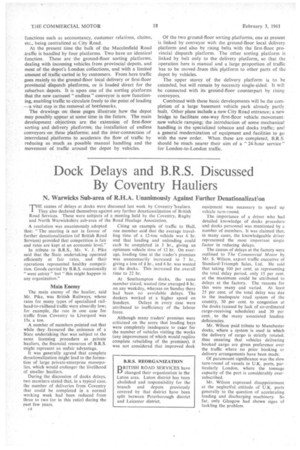Dock Delays and B.R.S. Discussed By Coventry Hauliers
Page 60

If you've noticed an error in this article please click here to report it so we can fix it.
N. Warwicks Sub-area of R.H.A. Unanimously Against Further Denationalizat;on
HE causes of delays at docks were discussed last week by Coventry 'hauliers. 1 They also declared themselves against any further denationalization of British Road Services. These were subjects of a meeting held by the Coventry, Rugby and North Warwickshire sub-area of the Road Haulage Association.
A resolution was unanimously adopted that: "The meeting is not in favour of further denationalization (of British Road Services) provided that competition is fair and rates are kept at an economic level."
In tribute to B.R.S., Mr. V. J. Pike said that the State undertaking operated efficiently at fair rates, and their operations represented healthy competition. Goods carried by B.R.S. occasionally "went astray" but "this might happen in any organization."
Main Enemy
The main enemy of the haulier, said Mr. Pike, was British Railways, whose rates for many types of specialized railhead=to-railhead traffic were absurdly low; for example, the rate in one case for traffic from Coventry to Liverpool was 15s. a ton.
A number of members pointed out that while they favoured the existence of a State undertaking that was subject to the same licensing procedure as private hauliers, the financial resources of B.R.S. might represent an unfair advantage.
It was generally agreed that complete denationalization might lead to the formation of large private-enterprise monopolies, which would endanger the livelihood of smaller hauliers.
During the discussion of docks delays, two members stated that, in a typical case, the number of deliveries from Coventry that could be completed in a normal working week had been reduced from three to two (or in this ratio) during the past few years.
r4
Citing an example of traffic to Hull, one member said that the average travelling time of a 12-ton vehicle was 6 hr. and that loading and unloading could each be completed in 3 hr., giving an optimum vehicle time of 12 hr. On average, loading time at the trader's premises was unnecessarily increased to 7 hr.. giving a loss of 4 hr., and 6 hr. was wasted at the docks. This increased the overall time to 22 hr.
At Southampton docks, the same member stated, wasted time averaged 8 hr. on any weekday, whereas on Sunday there had been no avoidable delays. The dockers worked at a higher speed on Sundays. Delays in every case were attributed to inefficiency of the labour force.
Although many traders' premises Were criticized on the score that loading bays were completely inadequate to cater for the number of vehicles visiting the works (any improvement of which would reqiiire complete rebuilding of the premises), it was not considered that improved dock equipment was necessary to speed up vehicle turn-round.
The importance of a driver who had detailed knowledge of docks procedure and docks personnel was mentioned by a number of members. It was claimed that, in many, cases, the knowledgeable driver represented the most important single factor in reducing delays.
The causes of delays at the factory were outlined to The Commercial Motor by Mr. S. Wilson, export traffic executive of Standard-Triumph Sales, Ltd. He said that taking 100 per cent, as representing the total delay period, only 15 per cent. at the maximum could be attributed to delays at the factory. The reasons for this were many and varied. At least 25 per cent, of the total delay was due to the inadequate road system of the country, 30 per cent, to congestion at the docks (caused by lack of co-ordinated cargo-receiving schedules) and 30 per cent., to the many associated loading deficiencies,
Mr. Wilson paid tribute to Manchester docks, where a system is used in which the delivery of cargo is strictly rotated, thus ensuring that vehicles delivering booked cargo are given preference over the traffic where no prior booking or delivery arrangements have been made.
Of paramount significance was the slow turn-round of vessels in U.K. ports, particularly London, where the tonnage capacity of the port is considerably oversubscribed.
Mr. Wilson expressed disappointment at the neglectful -attitude of U.K. ports generally to the question of accelerating loading and discharging machinery. So far, only Glasgow had shown signs of tackling the problem.
































































































































